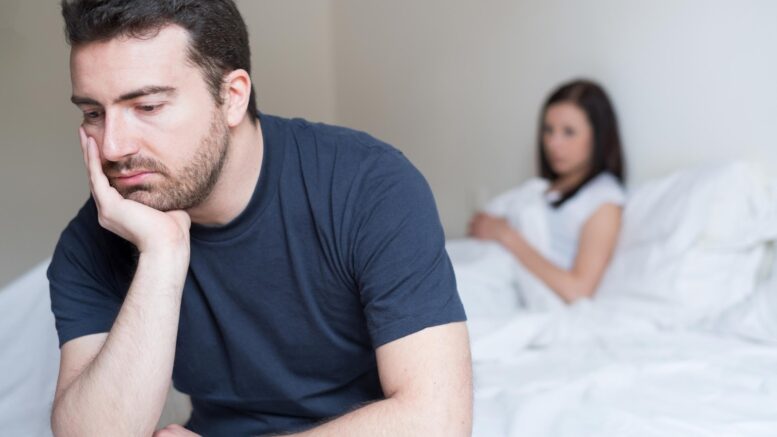Low testosterone or male hypogonadism is a condition where the body fails to produce enough hormones that play a significant role in masculine growth and development.
This condition is either innate or can develop later in life due to an injury or infection affecting the testicles, pituitary gland, or hypothalamus. Low testosterone levels can result in symptoms like erectile dysfunction, infertility, hair loss, anxiety, muscle, and bone mass loss, etc.
In order to treat this condition, most people go for testosterone replacement therapy. However, there are tested natural ways that can help in overcoming hypogonadism.
What are the Symptoms of Hypogonadism?
Listed below are reasons that predict the existence of hypogonadism in a male:
Erectile Dysfunction
Erectile Dysfunction is one of the primary indicators of low testosterone labels in a male. Erectile dysfunction is defined as difficulty in getting or keeping up an erection.
Reports have claimed that close to half of the men population between the age of 40 to 70 experience some form of erectile dysfunction. In most cases, this is caused due to physical causes.
These include heart disease, obesity, diabetes, high cholesterol, atherosclerosis, Parkinson’s disease, tobacco addiction, and more. Hormone Therapy For Men is the primary choice to overcome ED.
Testicular Atrophy
Testicular atrophy is a medical term that refers to the shrinking of the testicles. This can arise due to an injury, exposure to harmful conditions, or an underlying condition.
The symptoms of testicular atrophy before puberty include underdeveloped facial hair, public hair, and larger-than-normal penis size. However, the symptoms after puberty are different. These include infertility, decreased sex drive, softer testicles, and more.
Gynecomastia
Gynecomastia is a medical condition where men develop abnormally large male breast tissues. The main cause of this condition is low testosterone levels in men. The body of men produces both testosterone and estrogen, although the levels of estrogen are lower.

In the case of gynecomastia, the man’s body starts to have more estrogen levels than testosterone. Gynecomastia can occur because of testicular cancer, swelling, accident, cancer treatments, including radiation and chemotherapy, and damage to cells in the testes.
Depressed Mood
Several reports have claimed that low testosterone levels in men give rise to less concentration, irritability, anxiety, and depression.
Low sex drive, diminishing energy, and overall fatigue crush the confidence and self-esteem of the person, giving rise to self-doubt and criticism as a result of the embarrassment. Most men try to overcome this problem by relying on hormone treatments.
Obesity
Hypogonadism is also associated with sudden increased fat mass. As a result of obesity, most men also tend to get type II diabetes. Testosterone levels influence the distribution of fat tissues. Muscles are the main source of burning calories.
Therefore, the loss of muscle mass as a result of low testosterone can lead to weight gain. Moreover, with unbalanced testosterone levels, men often feel tired and fatigued. This tiredness leads to less or no physical activity, resulting in increased body fat.
5 Proven Ways to Increase Male Hormones Levels Naturally
While most men take recluse in hormone therapies, the above-mentioned symptoms can also be cured by natural means, provided they are followed with dedication and regularity. Listed below are ways to overcome low hormone-related problems in men naturally:
Exercise Regularly
Exercising is the most effective method of preventing hormone-related problems. Regular exercise helps in boosting testosterone levels. A study in 2020 reported that increased physical activity was much more beneficial and effective for increasing testosterone levels. Others like this Growth Matrix review claim that specific physical exercise may help increase your libido, but they should be taken with a grain of salt.
This is also crucial to reduce the increased fat accumulation as a result of low testosterone levels.
Avoid Alcohol
Alcohol consumption is one of the primary reasons for low testosterone levels in men. Alcohol consumption has long-term health complications, mainly infertility. Alcohol impairs the function of Sertoli cells in the testes. These cells are important for sperm maturation.

Alcohol is one of the main causes of erectile dysfunction and low libido. It can also result in reduced testicular function and testicular atrophy. Thus reducing or completely giving up on alcohol can help in curing low testosterone-related problems.
Eat Zinc and Magnesium Rich Food
Consuming zinc-rich food does wonders in boosting testosterone levels. Zinc is very important for sperm health and reproductive function. The deficiency of zinc is one of the main causes of hypogonadism.
Some popular food items rich in zinc are oysters, red meat, poultry, nuts, beans, and other shellfish. However, ensuring that mineral is consumed at normal levels is important.
Alongside this, magnesium supplements are also helpful in boosting testosterone levels. Some of the main sources of magnesium are beans, lentils, seeds, nuts, figs, and more.
Get Enough Vitamin D
Vitamin D deficiency is also a main cause of depleted testosterone levels in men’s bodies. Vitamin D promotes bone health. It helps in protecting the body from health conditions such as osteoporosis. In addition to this, it also looks after healthy nerve and muscle function.
Low testosterone levels in men can typically lead to erectile dysfunction and decreased sex drive. This is the reason that taking vitamin D supplements can help boost testosterone levels.
Some common food items that can help increase vitamin D levels in the body are salmon, egg, cod liver oil, cheese, milk, and tuna fish.
Get Enough Sleep
Getting enough sleep is crucial to ensuring healthy testosterone levels in the body. It is important to sleep at least seven hours a day. This is because peak testosterone production is noticed during sleep hours. An irregular sleep cycle will also lead to insomnia.
Research has proved that the hormone cortisol increases with sleep duration becoming less. This results in wakefulness, shallower, and shorter sleep, affecting testosterone growth.
Thus, having a healthy sleep cycle is very important. To ensure this, one should remove all distractions, avoid electronic screens for an hour before bed, and reduce nicotine, caffeine, and alcohol consumption.
Conclusion
Low testosterone levels can be a cause of concern both mentally and physically. While most men experience hypogonadism at a later stage in life, in some cases, it is innate and hereditary.
The long-term effects of low-testosterone levels are a serious cause of concern and need to be treated as early as possible. There are proven ways of naturally increasing the body’s testosterone counts without taking any supplements. Still, make sure to only seek medical advice from trusted and reliable health care professionals.
References:
- Rivas AM, Mulkey Z, Lado-Abeal J, Yarbrough S. Diagnosing and managing low serum testosterone. Proc (Bayl Univ Med Cent). 2014 Oct;27(4):321-4. doi: 10.1080/08998280.2014.11929145.
- Huo S, Scialli AR, McGarvey S, Hill E, Tügertimur B, Hogenmiller A, Hirsch AI, Fugh-Berman A. Treatment of Men for “Low Testosterone”: A Systematic Review. PLoS One. 2016 Sep 21;11(9):e0162480. doi: 10.1371/journal.pone.0162480.
- Jia H, Sullivan CT, McCoy SC, Yarrow JF, Morrow M, Borst SE. Review of health risks of low testosterone and testosterone administration. World J Clin Cases. 2015 Apr 16;3(4):338-44. doi: 10.12998/wjcc.v3.i4.338. PMID: 25879005; PMCID: PMC4391003.
